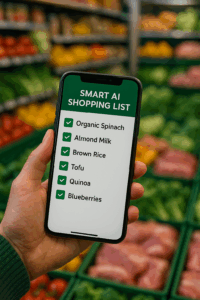Managing groceries with limited time is a real struggle. Between work, family, and daily life, planning what to eat and what to buy can feel overwhelming. That’s where tools like an
AI shopping list come into play. These smart systems make the process quicker and more manageable, especially for people who don’t want to spend their weekends organizing food runs.
The invisible time drain of grocery planning
If you think about it, creating a shopping list is more complex than it seems.
You start with thinking about meals, checking your pantry, cross-referencing with your calendar, and trying to balance nutrition, cravings, and budget. It’s mental juggling, and it burns time and energy—especially when you’re tired after a workday.
Now add family needs, dietary preferences, or even a rotating schedule, and your 10-minute list becomes a 45-minute admin task. And let’s be honest, most of us are not writing a perfect list every time. That’s where AI steps in.
What AI actually does for you
At its simplest, an AI shopping list app learns from your habits. It tracks what you usually buy, how often, and when. After a few uses, it starts suggesting items before you even remember them. That alone saves minutes per session.
Some apps go further and sync with your meal planner, generating a list based on your weekly meals. Others scan your pantry digitally (using barcode scanning or manual input) and tell you exactly what you’re low on.
These tools don’t just suggest—they prioritize. If you’re running out of something you always use, it gets flagged. If you skipped a usual item last week, it gently reminds you.
Automatic reordering and calendar syncing
One feature I now rely on is calendar integration. I can link my work schedule to the app, and it adjusts suggestions based on how busy my week looks. That means on hectic weeks, it might recommend quick meals with fewer ingredients, and for calmer ones, it might suggest those more elaborate dishes I like on Sundays.
Some apps even support automatic reordering through online grocery stores. That means when you approve your list, the app can place the order directly with your store of choice.
Why it works for busy people
If you work long hours, have kids, or even if you’re just someone who prefers not to spend Saturday mornings in supermarket aisles, AI lists save time on three fronts:
- No more starting from scratch
- No need to second-guess what you forgot
- No back-and-forth texts with your partner asking if you’re out of eggs
It creates mental space too. You can focus on what you’ll cook and enjoy, not what you might be missing.
Bonus: syncing with your household
Another underrated feature is the ability to sync with other people in your house. My partner and I share the same list. If she adds something, it updates in real time. That’s ended countless “can you check if we have milk” conversations.
What about mistakes?
No tool is perfect, and sometimes AI can make odd suggestions. But every app I’ve tested lets you override, delete, or modify the list easily. You stay in control—it just does the heavy lifting for you.
Conclusion
If you’re someone who values time and still wants to enjoy home-cooked meals, AI-powered shopping lists can make a real difference. You start small, and over a few weeks, you’ll notice how much time and energy you’re saving.
If you’re also trying to eat healthier without the extra planning stress, take a look at how
AI can align your groceries with your health goals.




